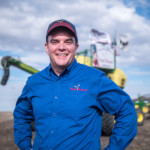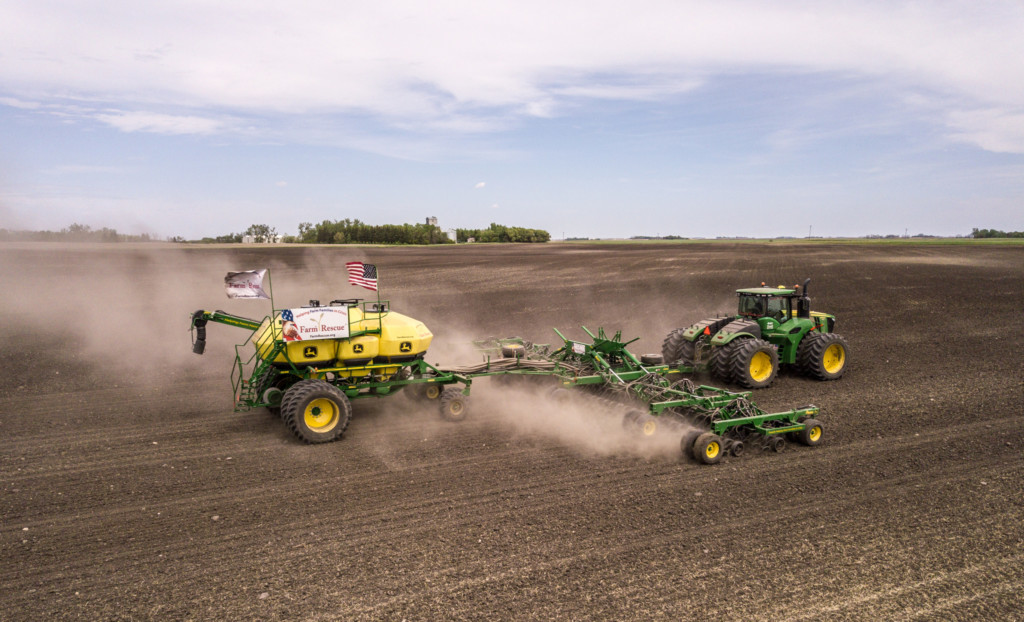 By Angela Dansby
By Angela Dansby
“Marty, whatever happens, don’t ever go to 2020,” read a WhatApp joke in reference to the movie “Back to the Future.”
No lie. This year was one most of us would like to forget. But there are some good news stories worth remembering. For example, Farm Rescue recently came to the rescue of a North Dakota farmer hospitalized with COVID-19.
“We see that one of the biggest financial drains on a family is an unexpected medical injury or illness and, of course, a natural disaster,” says FarmRescue.org. “It is even more pronounced on a farm where a family’s livelihood depends on the ability to plant, harvest or provide for their herd. Farm Rescue gives families a chance to continue their livelihood by providing the necessary equipment and manpower (free of charge) to get the job done.”
 This Midwestern volunteer organization provides planting, haying, harvesting and livestock feeding assistance to farm and ranch families in crisis due to a major injury, illness or natural disaster. Founder Bill Gross, who grew up on a farm in North Dakota, launched it in 2005 due to his heart for the heartland.
This Midwestern volunteer organization provides planting, haying, harvesting and livestock feeding assistance to farm and ranch families in crisis due to a major injury, illness or natural disaster. Founder Bill Gross, who grew up on a farm in North Dakota, launched it in 2005 due to his heart for the heartland.
“I just love rural America and its people,” he says.
The 1980s farm crisis forced his parents to sell their land and most of their cattle, which left an indelible impression on Gross. While it inspired him to leave the farm (he became a pilot and has flown for United Parcel Service for 27 years), spiritually, he remained on it. Whenever he flew over farmland as a pilot, he thought “I wonder how those farm families are doing down there?” He was concerned about changing rural demographics (e.g., fewer farms, less children) and his father’s concern when he was farming what would happen if anything happened to him.
“There were increasingly fewer neighbors to help one another in rural America,” Gross notes. “So, there was a need for a formal organization to help farm families in need.”
In 2005, a close chaplain friend asked what Gross would do in retirement. Gross replied: “I’m going to be this random Good Samaritan who buys a tractor and goes around helping farm families plant their crops when they have a major injury or illness.”
Why wait until retirement?” the chaplain asked.
That was just the encouragement Gross needed. At age 39, he started Farm Rescue with about $20,000 of his own money plus a few sponsors and five volunteers, including himself. They helped 10 farm families that year.
““My heart never left the farming community,” Gross says. “I wanted to return to my roots and give back even though I wasn’t able to farm [professionally] myself.”
Today, Farm Rescue has about 1,000 volunteers nationwide and a handful of employees. Several sponsors have joined the cause, such as John Deere, and they often “come to the rescue” on their own volition. They serve seven major commodity-producing states: North Dakota, South Dakota, Minnesota, Montana, Nebraska, Kansas and Iowa. Services include planting, harvesting – including plenty of canola – hauling crops, haying and livestock feeding. Farm Rescue receives hay donations and has its own fleet of semi-trucks.

“Every farm is important to rural America,” Gross says. “I value giving back to farmer livelihoods.”
To date, Farm Rescue has helped about 700 farm families and delivered thousands of loads of hay in wake of natural disasters. Unsurprisingly, this year it had higher demand due to COVID-19 putting several farmers in the hospital.
“It’s affected farmers drastically,” Gross told ABCNews.go.com. “They were already at what I feel was the breaking point. There’s been persistently low commodity prices, natural disasters and now COVID … when you add a major injury or illness to the challenges they already faced, it just can be overwhelming … financially and emotionally.”
Farm Rescue prioritizes cases as it can only help 50 to 85 percent each year.
“It varies based on funding and weather,” Gross explains. “Plus, we can always use more volunteers.”
While experienced farmers are ideal volunteers, anyone can participate as non-farming tasks are available and people can be trained in some farming duties. It’s an ideal situation for agricultural students or others interested in farming to get hands-on experience.
“We’ve had a core group of volunteers for 15 years, but also many ad hoc people, even from urban areas like New York City who have never been on a farm before,” Gross says. “We train them if they are committed to multiple years of volunteering.”
Gross learned how to farm from his parents. Even though he stepped away from farming for 20 years, he quickly recalled how in the first crisis he mitigated.
“It’s like riding a bicycle,” he says, albeit a high-tech bike compared to the model 15 years ago. “And I’m very familiar with canola as there’s a lot of it in northern North Dakota. In fact, I’ve planted lots of canola. It’s different than other crops, requiring sensitivity in planting. Depth is critical.”
Farm Rescue currently helps “the breadbasket that feeds America” but may expand in the next five years to southerly states like Illinois, Ohio, Missouri, Oklahoma, Texas and Alabama, Gross said. He is also interested in recruiting agricultural students and working with groups like Futures Farmers of America and 4-H.
Farm Rescue volunteers are usually retirees or full-time employees who use vacation time to literally lend helping hands. Non-farmers are supervised by a field operations manager.
“Farming is one of the most dangerous occupations in the world,” Gross notes, recalling lending a hand to a farmer who lost one in an occupational accident.
“Farmers are prideful people who typically don’t ask for help,” he adds, even in the case of the man above. “They don’t want to be a charity case, just helped when needed to bridge a crisis. We have an avenue of goodness to help them.”
Like he did, Gross strongly advises people interested in humanitarian activities to act now.
“When you have a desire to help others, don’t procrastinate, do it now,” he advises. “Someday is today. Link up with a good non-profit or if you want to start your own avenue of goodness, don’t let ideas slip away from you. It’s so sad when people discount an idea because it often never comes back.
“It’s human nature to think of reasons why you can’t do something charitable: no time, no money, no one’s going to help. Don’t listen to that. Instead, convince yourself that it is going to work. Others will help and share your vision.”
While 2020 goes down as a “bah humbug” year, it brought out the Good Samaritan in Gross and many others, reminding us all of what it means to be human.
Apply to volunteer or receive help at FarmRescue.org.
Angela Dansby is director of communications for the U.S. Canola Association.